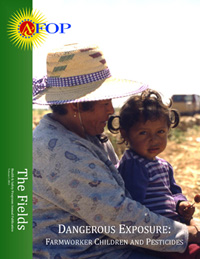26
Apr
Report Examines Impact of Pesticides on Farmworker Children
(Beyond Pesticides, April 26, 2011) One year after the President’s Cancer Panel released its groundbreaking report highlighting environmental causes of cancer, the non-profit Association of Farmworker Opportunity Programs (AFOP) released a new report, Dangerous Exposure: Farmworker Children and Pesticides. The report focuses on farmworker children, examining birth defects, neurological and behavior disorders, respiratory disease, as well as leukemia and other childhood cancers and their connections to pesticides.
“The weight of evidence described in our report, Dangerous Exposure: Farmworker Children and Pesticides, is overwhelming, if not conclusive,” notes Levy Schroeder, Director of Health & Safety Programs at AFOP. “The risk is high for farmworker children whose lives are surrounded by dangerous agricultural toxins.”
In a ten-month immersion in evidence-based findings on pesticide exposures, farmworker children and various illnesses, including cancer, the AFOP Health and Safety team reviewed primary scientific research published in professional medical and public health journals. In an effort to provide a more comprehensive understanding of the issue of pesticide exposure to farmworker children, the team also conducted focus groups and interviews with farmworker parents around the country. The parents shared stories of exposure, of having to make choices they know are not healthy for their children, of their fears for their families, and of hope that one day things will change.
In the introduction, the report states: Pesticide exposure occurs at work in the fields and also at home. Farmworkers may bring their families into contact with pesticides inadvertently through their clothes or unsafe storage of chemicals. However, thousands of children all over the country are more directly exposed to pesticide residues while they labor in fruit, vegetable, and flower crops. Discriminatory laws exempting farmworker youth from safe working conditions as they harvest on farms put them at particular risk for contact with these chemicals. Parents in farm work, who largely earn below a living wage, often opt for their children to work with them in the fields in order to provide the basics for the family. Whether exposed through parents’ field work or their own, children who develop illnesses as a result of pesticide exposure pay the price for our demands for cheap food. Coupled with the concerns of farmworker parents in their own voices about pesticide exposure, the following findings demonstrate that the health of these children is at stake.
The authors recommend that consumers know where their food comes from and encourages people to research labor practices of the companies you. They recommend eating organic and fairly traded foods whenever possible, and given the opportunity, “thank farmworkers for their necessary and important labor.”
Our food choices have a direct effect on those who grow and harvest what we eat around the world. This is why food labeled organic is the right choice. In addition to serious health questions linked to actual residues of toxic pesticides on the food we eat, our food buying decisions support or reject hazardous agricultural practices, protection of farmworkers and farm families.
For more information on the importance of eating organic food for you, workers and the environment, check out Beyond Pesticides’ Eating with a Conscience food guide and organic food program page.
The Association of Farmworker Opportunity Programs is a non-profit, national federation of 52 non-profit and public agencies that provide training and employment services to migrant and seasonal farmworkers. Our mission is to improve the quality of life for all farmworkers and their families through advocacy, education, and training. Dangerous Exposure: Farmworker Children and Pesticides, authored by AFOP’s Health and Safety Programs, is the first volume in The Fields, a new annual publication series that will center on farmworker health and safety issues.











